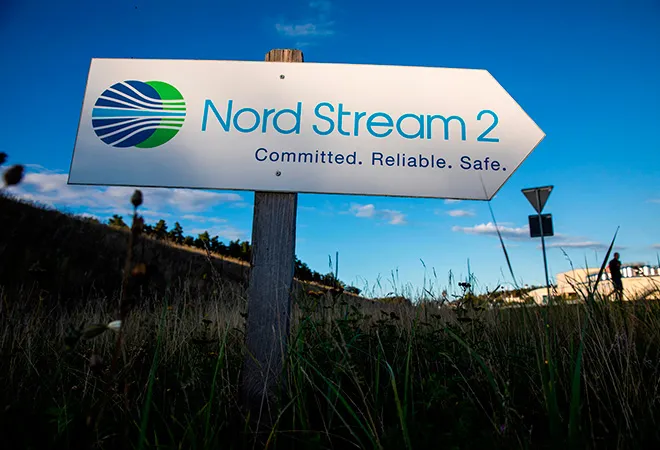
On 21 October, the US announced its decision to expand the ambit of sanctions against Nord Stream 2 (NS2) — the under-construction 1,234-kilometre long natural gas pipeline from Russia to Germany across the Baltic Sea — to cover any entity providing services for ‘upgrades or installation of equipment’ for any pipe-laying vessels. Earlier in 2019, US sanctions had been imposed on vessels ‘laying pipe at least 100 feet below sea level for Nord Stream 2,’ resulting in a disruption of construction activity.
The latest developments are believed to target the Russian pipe-laying vessel Akademik Cherskiy, which has been pressed into service to complete the remaining 147-kilometer of construction work under Danish waters in the absence of foreign vessels. Akademik Cherskiy is reported to be waiting for upgrades and an interference with this process to delay or stall the progress on NS2 is believed to be the aim of American sanctions. This comes after hopes were raised for completion of the project when Danish authorities gave their go-ahead to lay pipes under the country’s waters using ‘less technologically advanced ships’ to bypass US sanctions in July, clearing a critical hurdle in the completion of the project.
However, just a day after German foreign minister expressed confidence that the pipeline would be completed and that the country will not ‘bow to political pressure from the US,’ the latest sanctions have been announced. There had been some speculation about the poisoning of Russian opposition leader Alexey Navalny leading Germany to break away from NS2 but that speculation has now been laid to rest, with Germany keeping its tradition of delinking the commercial energy deals from political events. The largest natural gas importer in the EU now faces the challenge of dealing with the latest US sanctions in order to ensure that the project goes ahead. Earlier this month, the Polish anti-monopoly regulator had imposed a $7.6 billion fine on Gazprom for going ahead with NS2 without its approval; having ruled it to be ‘anti-competitive’ in 2016. This move is not expected to be a threat to the project.
These developments are the latest in a long series of confrontation between the supporters and opponents of the pipeline — the arguments for which are as much economic in nature as they are geopolitical.
Envisioned in 2015, the pipeline runs parallel to the existing Nord Stream 1 pipeline under the Baltic Sea and reaches northern Germany, before using the European pipeline system to supply natural gas across the unified market. It is a joint project bringing together Russian gas giant Gazprom and five European companies — ENGIE, OMV, Royal Dutch Shell, Uniper and Wintershall — with both the sides contributing half of the financing for NS2. With a capacity of 55 bcm per year, the pipeline would transport gas from the Yamal peninsula, doubling the total capacity alongside Nord Stream 1. The EU 27 in 2019 imported 44.7 percent of their natural gas from Russia making it their largest partner. This was followed by Norway, Algeria, Qatar and Nigeria at 21.3, 12.1, 6.3 and 5.9 percent respectively.
The supporters of NS2 argue that the pipeline is needed for meeting the energy needs of Europe as the North Sea production of natural gas is projected to decline in the coming years and the European demand is expected to continue at present levels. The Russian pipeline offers steady supply from Bovanenkovo gas field in Yamal peninsula at competitive pricing due to a cut in the transit costs. Some estimates suggest that the resultant lower import prices will benefit not just Germany but all EU countries, as the gas imported will be supplied throughout the Union via the European pipeline grid. Another argument in favour of continuing this process has been that Ukrainian pipelines are old and need to be refurbished. This would mean a reduction in the amount of Russian natural gas for Europe transiting through Ukraine, which stood at about 40 percent in 2018 and is a steep reduction from 80 percent before Nord Stream 1 became functional. The operationalisation of NS2 will further push down this figure.
Russia has wanted to diversify away from Ukraine to avoid bilateral disputes affecting its energy ties with European partners and this idea only gained further ground in the aftermath of the 2014 crisis, acquiring a stronger geopolitical dimension. Similarly, Germany and other supporters would prefer their natural gas supplies not to be held up by Russia-Ukraine tensions, as has happened before in 2006 and 2009, when at the height of winter supplies to Europe were affected due to disputes between the supplier and transit state. This has the additional benefit of maintaining an economic relationship between Russia and Germany, as well as other EU states despite the sharp deterioration in ties since 2014 Ukrainian crisis. While there is no denying the significant downturn in the Russia-EU relationship, these ties allow a certain level of cooperation to continue. Also, in recent years, Ukraine has been fulfilling its natural gas needs through west-east reverse flow and has benefited from a favourable pricing via this process.
However, the opponents point to Ukraine and other transit states like Poland losing their revenue as a transit country as one of the reasons for opposition to the NS2. Some of the post-Soviet states in EU are particularly worried about dependence on Russian resources due to their strained ties with the former superpower. There is also an argument that the economic benefits will accrue more to Germany and other north-west European countries rather than central-eastern and southeast European countries. The latter remain concerned regarding lack of diversification of energy suppliers to EU and the impact of reduced transit volumes on their bargaining power with Russia. Some of the former Soviet states are also wary of the geopolitical impact of such a development, with Ukraine concerned about strategic vulnerability in the absence of any leverage. To these concerns, the US has added that NS2 makes the ‘eastern flank of NATO more vulnerable to Russian pressure.’
The differences have split the EU opinion on NS 2, with member states unable to arrive at a consensus policy. The commercial decisions are being weighed against geopolitical ones — highlighting divergences within the Union on ‘policy on Russia and energy’ that could worsen in the days ahead. The US sanctions have led to a warning from Germany that efforts to interfere in its policy making could have an impact on the transatlantic understanding on Russian sanctions. Already, the presidency of Donald Trump has damaged the EU-US relationship and such developments would only add to the dissatisfaction.
In NS2’s defence, experts argue that a combination of diversified sources of import for southern and central-eastern European states and a decline in pricing power of Russia due to ‘competitive, integrated gas market’ has made it harder to politicise the supply of gas. The construction of Nord Stream 1 also has not been seen as having negatively impacted EU energy security. Not only that, NS2 has already received the requisite clearances from the European Commission as well as country permits required for the construction, highlighting the viability of the project.
In contrast, any abandoning of the project that is 94 percent complete will have an adverse impact on the image of EU as a business partner as well as cause financial loss to European entities as well as Gazprom. The smooth supply of gas through the Ukrainian corridor also remains doubtful given the state of Russia-Ukraine ties. Such a move will also add to the differences between Russia and the European countries. In fact, even the completion of the pipeline is unlikely to do anything to stem the degradation of ties between Russia and the EU. If the statement of Foreign Minister Sergei Lavrov is any indication, it will be a long time before the two sides can engage in a full-scale partnership and will have to content themselves with the prevailing state of affairs. The same goes for Russia’s bilateral relations with key European countries, including with Germany that have suffered serious setbacks in recent years and show little sign of improvement. However, this does not necessarily preclude the two sides from engaging in mutually beneficial commercial deals that also offer the chance to prevent a complete disengagement.
In the light of these events, the key question now remains whether the Russian pipe-laying vessel can complete the task on its own and whether further stricter US sanctions will be implemented to derail the project. As of now, both Russia and Germany are committed to complete the project and expect that the project will be completed, albeit with a delay.
The views expressed above belong to the author(s). ORF research and analyses now available on Telegram! Click here to access our curated content — blogs, longforms and interviews.




 PREV
PREV


